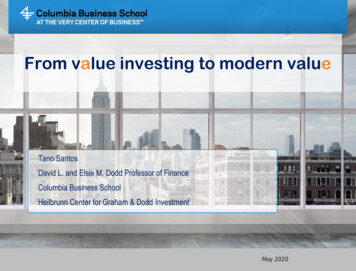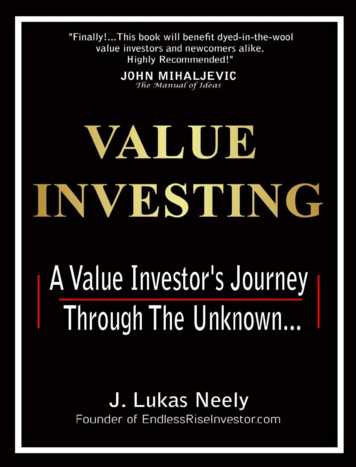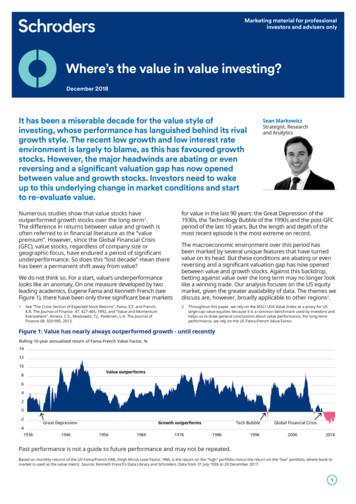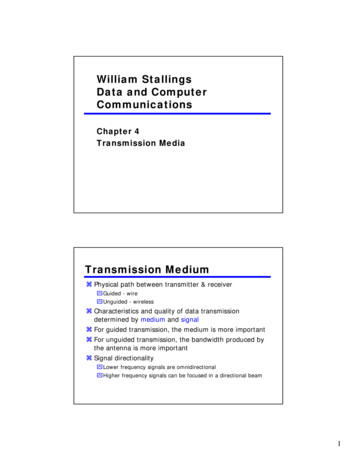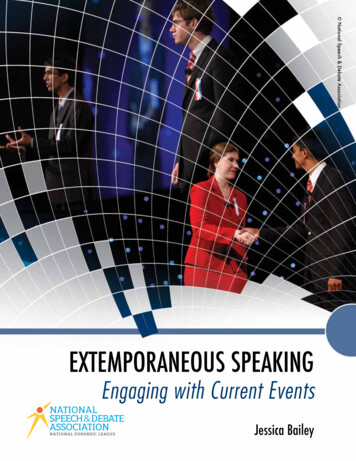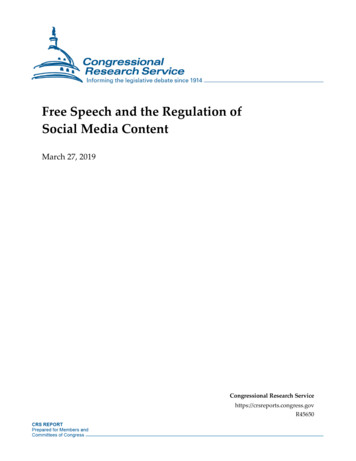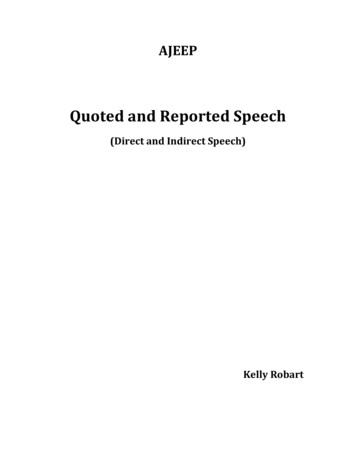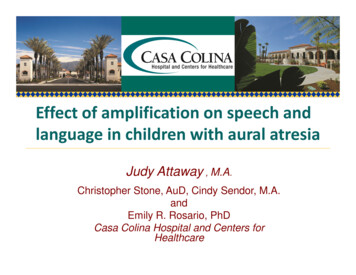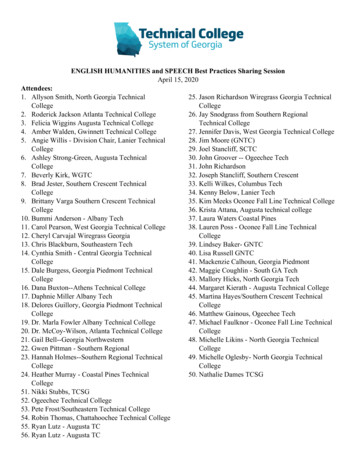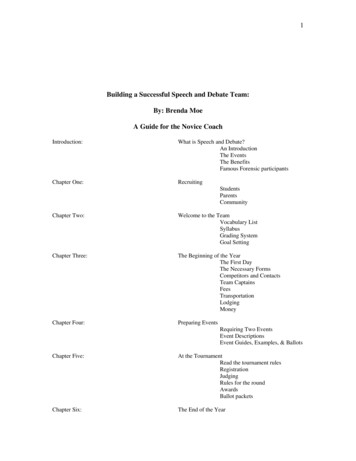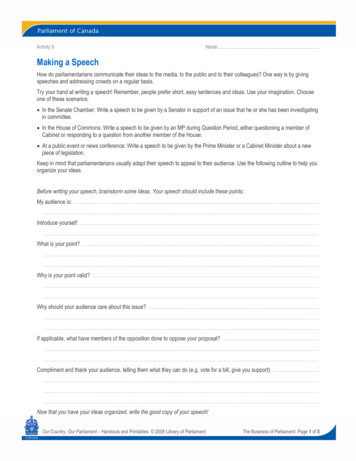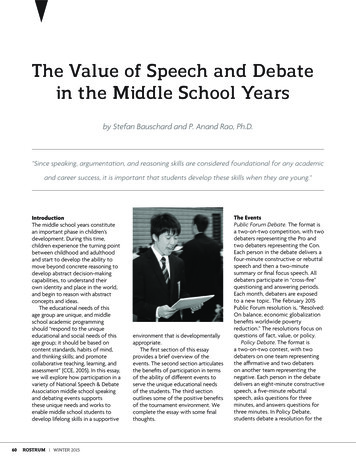
Transcription
The Value of Speech and Debatein the Middle School Yearsby Stefan Bauschard and P. Anand Rao, Ph.D."Since speaking, argumentation, and reasoning skills are considered foundational for any academicand career success, it is important that students develop these skills when they are young."IntroductionThe middle school years constitutean important phase in children’sdevelopment. During this time,children experience the turning pointbetween childhood and adulthoodand start to develop the ability tomove beyond concrete reasoning todevelop abstract decision-makingcapabilities, to understand theirown identity and place in the world,and begin to reason with abstractconcepts and ideas.The educational needs of thisage group are unique, and middleschool academic programmingshould “respond to the uniqueeducational and social needs of thisage group; it should be based oncontent standards, habits of mind,and thinking skills; and promotecollaborative teaching, learning, andassessment” (CCE, 2005). In this essay,we will explore how participation in avariety of National Speech & DebateAssociation middle school speakingand debating events supportsthese unique needs and works toenable middle school students todevelop lifelong skills in a supportive60ROSTRUM WINTER 2015environment that is developmentallyappropriate.The first section of this essayprovides a brief overview of theevents. The second section articulatesthe benefits of participation in termsof the ability of different events toserve the unique educational needsof the students. The third sectionoutlines some of the positive benefitsof the tournament environment. Wecomplete the essay with some finalthoughts.The EventsPublic Forum Debate. The format isa two-on-two competition, with twodebaters representing the Pro andtwo debaters representing the Con.Each person in the debate delivers afour-minute constructive or rebuttalspeech and then a two-minutesummary or final focus speech. Alldebaters participate in “cross-fire”questioning and answering periods.Each month, debaters are exposedto a new topic. The February 2015Public Forum resolution is, “Resolved:On balance, economic globalizationbenefits worldwide povertyreduction.” The resolutions focus onquestions of fact, value, or policy.Policy Debate. The format isa two-on-two contest, with twodebaters on one team representingthe affirmative and two debaterson another team representing thenegative. Each person in the debatedelivers an eight-minute constructivespeech, a five-minute rebuttalspeech, asks questions for threeminutes, and answers questions forthree minutes. In Policy Debate,students debate a resolution for the
www.speechanddebate.orgentire academic year, though theywill debate subsets of the resolution,such as Law of the Sea ratificationand Arctic energy development, inspecific debates. The current PolicyDebate resolution for 2014-15 is,“Resolved: The United States federalgovernment should substantiallyincrease its non-military explorationand/or development of the Earth’soceans.” The resolutions are alwaysfocused on questions of public policy.Lincoln-Douglas Debate. LincolnDouglas Debate is a one-on-oneformat where each side deliversone constructive speech and atleast one rebuttal speech. TheJanuary-February 2015 LincolnDouglas resolution is, “Resolved:Just governments ought to requirethat employers pay a living wage.”The topics last for two months andgenerally concern questions of value.Congressional Debate. Thisstyle of debate simulates the U.S.legislative process. Referred to asSenators or Representatives, thestudent competitors generate afull agenda of bills and resolutionsfor debate. Competitors givespeeches in support and in responseto proposed bills and networkto garner support. The topics fordiscussion vary by tournament, andcompetitors submit proposed billsahead of time.Extemporaneous Speaking. Thisis a limited preparation speakingevent that relies upon research ofcurrent topics and individual analysisin response to a prompt given atthe tournament. Students compileresearch materials on current eventsand topics that they and theircoaches anticipate will be selected.Extemp is often considered thespeaking event that is closest todebate in that participants developresearch skills, prepare for a varietyof topics, and construct speecheswith limited preparation.Original Oratory. In OriginalOratory, students present a tenminute speech on a topic of theirchoice. The speech can be intendedto inform or persuade and isprepared in advance. The speechshould be well-researched anddeveloped. Competitors balancecontent with delivery and style,and are encouraged to select topicsthat they care about. A preparedspeech can be used for multiplecompetitions.Storytelling. Students selecta published story that meets aspecified theme and then performup to five minutes of the story.Participants prepare to tell theirstory to young children. Manuscriptsare not allowed. Storytelling includesa full performance of the story,and competitors often use the fullstage space to act out the story.Competitors prepare new storiesfor each tournament to meet thespecified themes.Core SkillsAlthough there are a variety ofevents, there are fundamental skillsthat all students who participate inthese events have the opportunityto develop, including public speakingand argumentation skills—thefundamental building blocks ofspeaking and debating. Throughlearning these skills, they willdevelop many other academic skillsand have the opportunity to growas individuals as they develop fromchildren into adults.There is a growing body ofresearch that demonstratesparticipation in speaking anddebating competition promotes ahost of fundamental skills that leadto academic and personal success.Reasoning and decision-makingskills. The CCE (2005) argued thatmiddle school teachers need to“ask students to grapple withopen-ended questions based onmeaningful work and to synthesizeinformation so they can supporttheir opinions with evidence.” Thisis important because middle schoolstudents are “capable of critical andcomplex thinking and develop theseskills by using them.”This type of reasoning anddecision-making is exactly theskill set that competitive debatehelps students to develop. In orderto take any position in a debate,students must confront an openended question in the form of aresolution or motion and synthesizeinformation from a variety ofresources that they discover on theirown to make a consistent argumentthat is supported by evidence.This type of reasoning anddecision-making skill is thefoundation for critical thinking skills.Austin Freeley and David Steinberg(2005) contend, “since classical times,debate has been one of the bestmethods of learning and applyingthe principles of critical thinking”(p. 2). Other meta-studies includingAllen, et. al. (1999), Colbert (1987),Barfield (1989), and testimonialresearch (Katsulas & Bauschard, 2000)reach similar conclusions.Ideally, middle school academicopportunities will providestudents with chances to “explorerelationships and connections,and integrates information acrossdisciplines” (CCE, 2005). Sincespeaking and debating researchwill require students to draw oncontent in economics, philosophy,and political science, middleschool competition encouragesstudents to make connectionsacross these various fields toproduce an argument. To succeedin competition, students willneed to “explain, interpret, apply,analyze, synthesize, solve problems,and communicate information”effectively to a judge.Abstract reasoning andempathy. It is important formiddle school students to “listento others and develop respect fordivergent viewpoints” (CCE, 2005).Since debate requires students toaddress both sides of the topic,students are forced to confront andunderstand the perspective of theother. Development of this type ofempathy is important for individualsROSTRUM WINTER 2015 61
to accept the outcome of decisionsregarding matters of importanceto them and to be able to properlyengage their opponent’s arguments(within a contest debate or outside inthe community).At least one study (Rogers 2002,2005) indicates there is evidence thatdebaters are more socially tolerant.This occurs because debaters have todevelop arguments on both sides ofan issue, leading students to developempathy for the position of theiropponent (Harrigan, 2008; Muir, 1993).Empirical research proves that debateinvolvement enhances beneficialargumentative skills, while reducingverbal aggression (Colbert 1993, 1994).Reflecting on the Open SocietyInstitute’s lengthy experience, Breger(1998) reports that “debate teachesstudents to command attentionwith words, provides students withan alternate outlet for day-to-dayconflicts, and gives them a tool withwhich they can combat physicalaggression” (p. 66–67).Presentation skills. Studentsshould have mastered commonpresentation skills by the time theyfinish middle school (Kendall, 2008).Debate competition facilitates thedevelopment of a number of publicspeaking skills. Participation in PublicForum Debate requires studentsto present information that theyprepare in advance on importantpublic policy controversies toinexperienced judges and to convincethem that their side is best argued.Lincoln-Douglas Debate requiresthe same type of presentation butordinarily on value topics. OriginalOratory requires students to createa unique presentation that will movean audience emotionally. Extemprequires students to quickly assemblepresentations on a variety of currentevents.Confidence. It is important formiddle school students to developconfidence and self-esteem (CCE,2005). There is considerable evidencethat competitive debate developsconfidence and supports studentempowerment. Debate participants62ROSTRUM WINTER 2015“often experience debate as a formof personal empowerment. Thisincludes feelings of personal efficacy,educational engagement, andpolitical agency” (O’Donnell, 2010,p. 51). It gives students confidencethey need to interact with peers andauthority figures. As Cori Dauber(1989) explains, debate teachesstudents that “they ought notbe intimidated by the rhetoric ofexpertise” surrounding policy issues(p. 207). See also Bauschard (2014).Oral communication andadvocacy. The development oforal communication skills is animportant part of any middleschool curriculum (Henderson, n.d.).Oral communication, including thepersuasion of legislators, judges,executive branch officials, and thepublic at large is the lifeblood ofdemocracy. Debaters consistentlyrank improved oral communicationskills as one of the top benefits ofparticipation in debate (Huston, 1985;Lybbert, 1985; Matlon and Keele, 1984;Oliver, 1985; Williams, McGee, andWorth, 2001).Leadership training. Today manymiddle skill students are interested indeveloping leadership skills. Debate isa “premier training ground for.futureleaders” (O’Donnell, 1998). In the U.S.,many former debaters occupy strongleadership roles in society. Theseinclude Thomas Goldstein, cofounderof SCOTUSBLOG and a litigatorwho has argued more than 20 casesbefore the U.S. Supreme Court; NealKatyal, the deputy solicitor generalof the United States; John F. KennedyJr.; and numerous U.S. senators andrepresentatives.Practical life skills. Middle schoolstudents “need variety in their dayand in what is asked of them. [Theyalso] need increasing autonomy andresponsibility as well as opportunitiesto demonstrate that they can behaveresponsibly” (CCE, 2005). Debatecompetitions provide this not onlyby introducing substantial activelearning during the day but also byintroducing an environment wherestudents have to behave in a maturemanner between competitions, moveabout responsibly between roundsof debate, and interact with otheradults and peers in a responsiblemanner. Tournament environmentsalso provide a space with “abundantenergy and interest that should betapped instead of squelched” (CCE,2005).Social interaction skills. Theexpanded core curriculum hasidentified the importance of socialinteraction skills for middle schoolstudents. Well-developed socialinteraction skills are central tobuilding relationships, establishingpositive self-esteem, and foracceptance into society (“Social,”2012). While most students at thisage know most common socialrules, middle school is the time forthem to recognize social challengesand problem-solve to resolvethose difficulties. Participation inspeech and debate provides theopportunity to engage in role-playingand discussion of scenarios, both ofwhich may be especially helpful fordeveloping strong social interactionskills. “Social skills can be refinedby participating in activities such asdrama, debate, and health classes”(“Social,” 2012).Communication apprehension.Many middle school students sufferfrom some level of communicationapprehension (CA) or stage fright(Comadena & Prusank, 1998). CAis not limited to public speaking,however. We all experiencedifferent levels of apprehension invarious communication settings,including public speaking, meetings,interpersonal, and groups. Leftunattended, high levels of CAcorrelates with poorer academicperformance as students disengageand withdraw. Studies havealso documented that levels ofapprehension increase as studentsprogress from elementary tomiddle school. Throughout thisprogression, researchers have foundthat not only do higher levels ofCA correlate with lower academicachievement, but also that lower
www.speechanddebate.orglevels of CA correlate with higheracademic achievement. For example,this study found that students withlow CA had achievement scoresthat were 23% higher than studentsthat were high in CA (Comadena &Prusank, 1998, p. 274). Participation inspeech and debate, however, betterprepares students for handling theirapprehension. In a study conductedwith at-risk middle school students inAtlanta, participation in a computerassisted debate project resulted inlower levels of apprehension in allforms of communication, includinginterpersonal, group, and publicspeaking (Winkler, 2007, p. 797-8).Additional BenefitsIn addition to skills development,participation in speech and debatealso offers a number of otherbenefits.Significance beyond theclassroom. The CCE (2005) arguesthat activities middle school studentsparticipate in should have significancebeyond the classroom. Participationin speech and debate is certainly anactivity that has that significance.Students speak and debate aboutissues relevant to their local andnational communities, attempt topersuade judges and other studentsin the debate of their point of view,and may often need to confrontquestions of their own identity whenissues related to race and gender areintroduced into the debates.A safe and trusting environment.The CCE (2005) reports that middleschool students “are willing to takerisks if they believe they are in asafe and trusting environment.”Debate competitions offer suchan environment because studentsengage in individual rounds ofcompetition in a classroom againstspecific opponents with a singlejudge who provides constructivefeedback to the students. This“safe space” makes it possible forparticipants to test their skills andgrow as speakers and debaterswithout all of the risks associatedwith participating in a greater publicspace.Student Development and aVariety of EventsDifferent speech and debate eventsalso serve the developmentalneeds of different students asthey transition from childhood toadulthood. Storytelling supports thegrowth of concrete memorizationand basic presentation skills. Extempbuilds on these basic developmentalskills by requiring students toorganize arguments and supportinginformation into a presentationfor an audience. Lincoln-DouglasDebate requires that application ofargumentation and more abstractreasoning skills during an on-the-fly,give-and-take process. Public ForumDebate utilizes that same processbut requires students to do it whileworking with a partner. PolicyDebate requires all of that plus theability to manage a large quantity ofinformation and work with a partnerthroughout the entire process.Participating in speech anddebate during middle school yearsis arguably the most importantbecause they “are highly formativefor behavior patterns in educationand health that have enduring,lifelong significance” (CCE, 2005).Since speaking, argumentation,and reasoning skills are consideredfoundational for any academic andcareer success, it is important thatstudents develop these skills whenthey are young.ConclusionThe middle school years are highlyformative and provide the buildingblocks for essential skills that willenable students to succeed in highschool, college, and later in life.Deanna Kuhn’s research on the use ofdebate in middle school classroomsconfirms just how important thepractice of debate is for preparingstudents for academic success. Kuhn,Professor of Psychology at ColumbiaUniversity, compared two sets ofstudents in a public middle school inHarlem. Both sets of students took atwice-weekly philosophy class fromsixth through eighth grades. Onegroup was provided with a traditionalclassroom, with a textbook andteacher-led discussion. A secondexperimental group participated inonline debates, with four new topicsintroduced each year. The studentsin this experimental group wereassigned to sides on the topics, andwere encouraged to research theirsides and anticipate the argumentsthat their opponents might make. Atthe end of each year, both groupsof students were given writingprompts, and the experimental groupdemonstrated just what participationin debate has to offer.By the end of the third year,“nearly 80 percent of the students inthe experimental group were writingessays that identified and weighedopposing views in an argument. Lessthan 30 percent of the students inthe comparison group were doing so”(Burns, 2012).With their debate experience,students in the experimental groupdemonstrated an ability to recognizedivergent opinions, critically engageopposing views, and think abouthow opposing positions could beweighed and reconciled. It is difficultto imagine a parent or teacher whowouldn’t want the same for theirchild or student.(For article references, see next page.)Stefan Bauschard is the DebateCoach for the Lakeland SchoolDistrict and an assistant coach forHarvard Debate. He blogs atbauscharddebate.comP. Anand Rao, Ph.D. is AssociateProfessor of Communication andDirector of the Speaking Center andthe Speaking Intensive Program,University of Mary Washington.ROSTRUM WINTER 2015 63
ReferencesAllen, M., Berkowitz, S., Hunt, S., & Louden, A. (1999). A meta-analysisof the impact of forensics and communication education oncritical thinking. Communication Education, 48, 18-30.Barber, B. (2004). Strong democracy: Participatory politics for a newage. Berkeley: University of California Press.Bauschard, S. (2014). Empowerment through debate. Presentation inthe Dominican Republic, March 15.Breger, B. (1998). Building open societies through debate.Contemporary Argumentation and Debate, 19, 66-68.Burns, M. (2012). No debate: Kids can learn by arguing. Retrieved te-kids-canlearn-by-arguing-38932CCE. (2005). Turning points: transforming middle schools. Retrievedfrom ert, K.R. (1987). The effects of CEDA and NDT debate trainingon critical thinking ability. Journal of the American ForensicAssociation, 23, 194-201.Colbert, K.R. (1993). The effects of debate participation onargumentativeness and verbal aggression. CommunicationEducation, 42, 206-214.Comadena, M.E. & Prusank, D.T. (1998). Communication apprehensionand academic achievement among elementary and middle schoolstudents. Communication Education, 37(4), 270-77.Costa, C.V. (2005). Education for citizenship in the Caribbean: A studyon curricular policy and teacher training in Cuba, Haiti, and theDominican Republic. Retrieved from http://www.hrea.org/index.php?base id 104&language id 1&erc doc id 5209&categoryid 4&category type 3Dauber, C. (1989). Debate as empowerment. Journal of the AmericanForensic Association, 25, 205-207.Developing self-confidence and self-esteem in middleschool students. (2010, December 8). Retrieved eloping-selfesteem-self-confidenceFinkel, S. (2000). Civic education and the mobilization of politicalparticipation in developing countries. Retrieved from n2000/finkel.pdfFishkin, J.S. (2009). When the people speak: Deliberative democracyand public consultation. NewYork: Oxford University Press.Foundation for Democratic Youth (2014). Think in 3d: Communitydebate methods. Manual on file with author.Freeley, A.J., & Steinberg, D.L. (2005). Argumentation and debate:Critical thinking for reasoned decision making. 11th ed. Belmont,CA: Thomson Wadsworth.Harrigan, C. (2008). A defense of switch-side debate. Retrieved /10339/14746/harrigancd 05 2008.pdfHenderson, S.J. (n.d.). Integrating oral communicationskills into everyday learning. Retrieved kispaces.com/Integrating Oral Communication Skills into Everyday LearningHuston, D. (1985) What should be the goals of high school debate?An examination and prioritization. Paper presented at theNational Forensic League Conference on the State of High SchoolDebate, Kansas City, MO. ERIC Document #ED272942.64ROSTRUM WINTER 2015Innovations in civic participation. (2010). Dominican Republic.Retrieved from an/dominican-republic/Katsulas, J., & Bauschard, S. (2000). Debate as preparation for thelegal profession: A survey of debaters from the 1970s to 1990s.Paper presented at the annual meeting of the Southern StatesCommunication Association, New Orleans, LA, March 29-April 2.Kendall, J. (2012). Common core standards for middle school Englishlanguage arts. Retrieved from sh-Language/dp/141661463XLouden, A.D. (Ed.). (2010). Navigating opportunity: Policy debate in the21st century. International Debate Education Association.Lybbert, B. (1985). What should be the goals of high school debate?Paper presented at the National Forensic League Conference onthe State of High School Debate, Kansas City, MO. ERIC Document#ED272941.Matlon, R.J., & Keele, L.M. (1984). A survey of participants in thenational debate tournament, 1947–1980. Journal of the AmericanForensic Association, 20, 194-205.Mitchell, G.R. (1998). Pedagogical possibilities for argumentativeagency in academic debate. Argumentation and Advocacy, 35,41-60.Muir, S.A. (1993). A defense of the ethics of contemporary debate.Philosophy and Rhetoric, 26, 277-295.O’Donnell, T. (1998, January 7). The great debaters: A challenge tohigher education. Retrieved from onnellOwen, D. (2004). Citizenship identity and civic education in theUnited States. Paper presented at the Conference on CivicEducation and Politics in Democracies sponsored by the Centerfor Civic Education and the Bundeszentrale für Politische Bildung,San Diego, CA, September 26-October 1.Peters, J.D. (2005). Courting the abyss: Free speech and the liberaltradition. Chicago: University of Chicago Press.Rogers, J.E. (2002). Longitudinal outcome assessment for forensics:Does participation in intercollegiate competitive forensicscontribute to measurable differences in positive studentoutcomes? Contemporary Argumentation and Debate, 23, 1-27.Rogers, J.E. (2005). Graduate school, professional, and life choices:An outcome assessment confirmation study measuring positivestudent outcomes beyond student experiences for participantsin competitive intercollegiate forensics. ContemporaryArgumentation and Debate, 26, 13-40.Social interaction skills and the expanded core curriculum. (2012).Retrieved from http://www.eccadvocacy.org/section.aspx?FolderID 13&SectionID 143&DocumentID 6110Williams, D., McGee, B., & Worth, D. (2001). University studentperceptions of the efficacy of debate participation: An empiricalinvestigation. Argumentation and Advocacy, 37, 198-209.Winkler, C. (2007). Extending the benefits of debate: Outcomesof the computer assisted debate project. ConferenceProceedings – National Communication Association/AmericanForensic Association, Alta, Utah: 792-800.
foundation for critical thinking skills. Austin Freeley and David Steinberg (2005) contend, “since classical times, debate has been one of the best methods of learning and applying the principles of critical thinking” (p. 2). Other meta-studies including Allen, et. al
